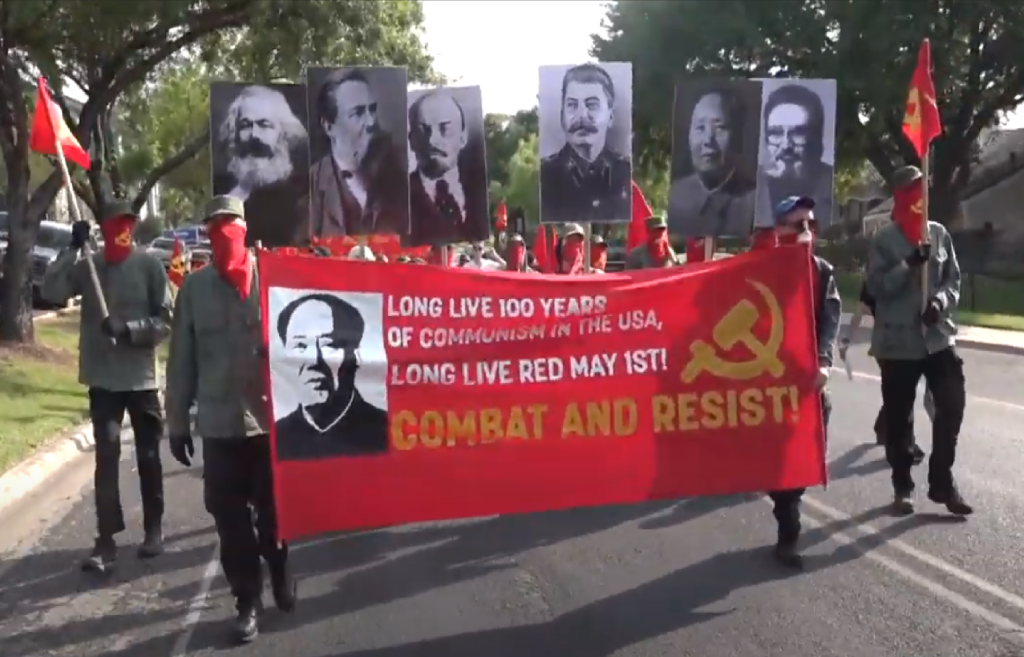Red Guards Cell, Austin, Texas. By Reddebrek, CC BY 3.0
A country’s slide into socialism/communism begins with socialist policies. And every one of these has been proposed in the United States: like an exorbitant minimum wage which is exorbitant and not tied to performance or return on labor, a universal basic income, charging for electricity usage based on income rather than quantity of electricity used, issuing carbon usage credits, allowing the state, not the consumer, to decide how much is enough, imposing a billionaire tax, taxing wealth transfers and inheritance to prevent parents from helping their children, and taxing unrealized capital gains to discourage saving and investing.
Beyond the purely economic, policies that mandate demographic quotas for promotions, hiring, firing, or school acceptance are examples of social engineering that removes the “profit motive,” the reward for hard work, disincentivizing hard work, and resulting in the promotion of those who cannot meet the quality standards.
Washington State has proposed eliminating the bar exam in order to increase diversity among lawyers. Oregon high school students will no longer need to be able to read, write, or do math in order to graduate, for the same reason.
United Airlines announced that it would prioritize diversity in its selection of trainee pilots. And in order to ensure that the younger generation understands only the state agenda, homeschooling will be banned.
Socialism/Communism has never worked, but somehow, people keep voting for it and believing that this time will be different. The truth is that it has caused tens of millions to starve to death while robbing hundreds of millions of their innovation, creativity, and motivation.
The entire society, working different jobs from research scientist to ticket puncher, for an equal number of turnip coupons, is so unnatural that it can only exist in a totalitarian system where people have no choice.
No capitalist nation ever forced people to earn a profit, but communist countries had to use their secret police and state surveillance to force people not to.
No one was ever shot trying to break into West Germany or swimming to Cuba.
Socialism cannot bring prosperity because it destroys the market functions of private property and eliminates the incentives for more productive people to work harder or more inventive people to innovate. Socialists are always worried about wealth inequality, and their solution always involves taking money from the harder-working, more efficient people and giving it to the less productive.
Socialists believe that if they were to forcibly redistribute the wealth, everyone would be better off. The first problem with this logic is that the people who have wealth now would be worse off if someone stole it.
The United States has the highest GDP per capita in the entire American continent, from Canada to Argentina, including the Caribbean. The US average income is about $76,000 per year.
In Haiti, it is $1,748. If the socialists had their way and redistributed the wealth evenly across the roughly 1 billion people in the Americas, the average would be $35,000 per year. So, US citizens would be giving up more than half their income but would still be working the same jobs, for the same number of hours.
If you received the same wage, no matter what, you would stop doing overtime, stop coming up with new ideas, and pretty much stop working at all. In the Soviet Union, there was a joke: “We pretend to work, and they pretend to pay us.”
Almost every communist country began by abolishing money and nationalizing production of everything, including food. Within a very short time, these countries faced famines.
With no profit incentive, there was no motivation for farmers to grow food. Additionally, with no money prices, there was no rational way to calculate the cost of planting versus the money earned from selling the produce or to calculate how many resources should be allocated to producing food versus producing some other product.
Nearly six million people in the USSR starved to death in the Soviet Famine (1931-1934). Roughly half of these were Ukrainians, living in the “breadbasket of Europe.”
During the Khmer Rouge period (1975-1979) in Cambodia, between one half and a third of the population died of starvation and overwork, although nearly 100% of the population was sent out to the fields to farm. Venezuelans are facing hunger, while Cubans are facing shortages of everything.
The winner of the socialist starvation death toll competition is Mao Zedong, whose Great Famine (1958-1962) killed 30 million Chinese.
India was resource-rich and had the largest workforce, but socialist policies led to India becoming synonymous with extreme poverty. The USSR was the most resource-rich country on the planet and had one of the largest workforces, but had an economy about 5% the size of the U.S. China similarly had a huge workforce, and it was not until 2007 that the average Chinese citizen was earning more than the average American was earning in the year 1900.
Vietnam also experienced a mini-famine caused by communism, but they quickly realized that by privatizing farming, they were able to increase rice production.
It was privatization that also ended the Chinese famine, and Deng Xiaoping allowing private sector entrepreneurs to earn profits that lifted 800 million Chinese out of poverty.
No former communist country has ever reverted to communism. And China and Vietnam, the world’s largest remaining communist countries, dramatically increased the welfare of their people by allowing market economics, profit, and private ownership.
But both China and Vietnam remain dramatically poorer than the US because of their refusal to completely let go of communism/socialism.
Given all the evidence against it, how can American socialists believe that this time will be different?
The post Socialist Policies: Steps Toward a System That Has Always Failed appeared first on The Gateway Pundit.







